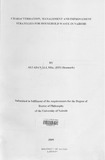| dc.description.abstract | National and international targets for solid waste recycling, recovery and diversion from landfill have been set to help in development of effective strategies. To meet these targets requires reliable information on the composition of household waste. One of the environmental concerns in Nairobi is poor handling of the household solid waste. Previous studies on the composition of the households waste in Nairobi have covered only some components of the waste stream with much localised central business district. Illegal dumping and burning are commonly practiced as waste disposal options with collapse of public waste management system.
Therefore, objective of this study was to conduct household waste characterisation, study existing management practices and model improvement strategies for household solid waste in Nairobi. The research methodologies involved questionnaire survey, waste sampling and analysis, focused group discussions, workshops, observation and literature reviews. The findings of the study has shown that the household solid waste generation and composition was food (organic) 73.2%, paper 6.8%, glass 3.4%, metal 5.3%, plastic, 7.8%, hazardous household solid waste and special waste 1.1%, electrical and electronic waste 2.7% and others 3.7%. An average daily household waste generation rates were 1065.84g, 1385.90g, 416.26g and 526.00g for Lavington, South B, Kangemi and Kibera respectively.
This implies that, of the sampled zones, 40.83% of the wastes are from South B, 31.40% Lavington, 12.26% Kangemi and 15.50% Kibera driven by improved income and household size resulting in high consumption patterns in the city modem lifestyles. These rates exclude quantities of the household solid waste removed for reuse, repair or recycling at the household level.
The study findings point to an increase of over 25% in the quantity of the daily generated household waste by Nairobi households over the last 10 years. Most of Nairobi household waste can be a great resource to generate more income for employment through recycling technologies. As a result proper Nairobi household management can contribute its share in the urban poverty reduction and sustainable development programme of the government. As there is no previous study of this kind covering Nairobi socio-economic groupings, the household waste generation rates is reported here could be safely taken as baseline for the entire Nairobi area.
The existing household solid waste management practices lack infrastructure, economic capital, weak enforcement and absence of incentives to support recycling systems. Nairobi household solid management practices are characterised by uncollected large volumes of waste, poor capacities, and uncoordinated disposal practices. This has impeded any action to be undertaken by waste management stakeholders both individually and collectively. Therefore, this study recommends establishment of Nairobi Waste Management Plan to be implemented by Nairobi Waste Management Bureau as a public-public partnership for effective management and improvements of the household waste in Nairobi. | en_US |

